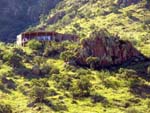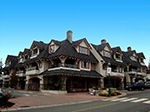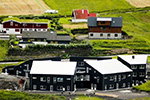Quad-Lock Projects Win Big at ICF Builder Awards |
 Building Projects using Insulated Concrete Forms (ICFs) by Quad-Lock Building Systems were recognized with four awards at the ICF Builder Awards, recently held at World of Concrete in Las Vegas, NV. Within six total categories, Quad-Lock projects placed first or "Best in Class" in three categories and second in another. The annual awards competition showcases the most innovative projects from ICF companies around the globe and again was a very popular event with a flood of entries from the best in the industry. The award winners exemplify the energy-efficiency, comfort, creative architecture, and speed of installation that can be achieved with ICF construction. Quad-Lock projects won two awards in last year's competition. Building Projects using Insulated Concrete Forms (ICFs) by Quad-Lock Building Systems were recognized with four awards at the ICF Builder Awards, recently held at World of Concrete in Las Vegas, NV. Within six total categories, Quad-Lock projects placed first or "Best in Class" in three categories and second in another. The annual awards competition showcases the most innovative projects from ICF companies around the globe and again was a very popular event with a flood of entries from the best in the industry. The award winners exemplify the energy-efficiency, comfort, creative architecture, and speed of installation that can be achieved with ICF construction. Quad-Lock projects won two awards in last year's competition.
This year Quad-Lock projects received awards in the following categories:
Large Residential:
 Best in Class for the Salero Residence in Tubac, Arizona. The 3,500 sqft building set in a remote mountainous area integrated R-30 "unbalanced" (thermal mass optimized) insulation technology with 4" thick continuous insulation on the exterior and 2" on the interior. The owner and general contractor praised the flexibility of the Quad-Lock panel system to easily build the numerous radius walls on site with no special order parts or equipment, including tight 4' and 5' radius walls. Best in Class for the Salero Residence in Tubac, Arizona. The 3,500 sqft building set in a remote mountainous area integrated R-30 "unbalanced" (thermal mass optimized) insulation technology with 4" thick continuous insulation on the exterior and 2" on the interior. The owner and general contractor praised the flexibility of the Quad-Lock panel system to easily build the numerous radius walls on site with no special order parts or equipment, including tight 4' and 5' radius walls.
See the Photo Gallery and Project Profile.
Multi-Family:
 Best in Class for the Villa Rose Condominiums in Qualicum Beach, BC. The 65,000 sqft project consists of 20 condo units on the top levels with retail space on the ground level plus a full parking garage below. ICF walls and Quad-Deck ICF floors were chosen for their ability to withstand the cold, damp climate and to work within a very tight jobsite. To fit in seamlessly with the town's regulated "dormer" style architecture, the unique design incorporated many cantilevers and 287 corners over 3 levels with every storey using a different floor plan. Best in Class for the Villa Rose Condominiums in Qualicum Beach, BC. The 65,000 sqft project consists of 20 condo units on the top levels with retail space on the ground level plus a full parking garage below. ICF walls and Quad-Deck ICF floors were chosen for their ability to withstand the cold, damp climate and to work within a very tight jobsite. To fit in seamlessly with the town's regulated "dormer" style architecture, the unique design incorporated many cantilevers and 287 corners over 3 levels with every storey using a different floor plan.
Read the Project Profile.
Light Commercial:
 Best in Class for Midvag Kindergarten on the Faroe Islands. Located in a remote location between Norway & Iceland, Quad-Lock's ICF was chosen to resist some of the world's harshest weather conditions and keep the island's youngest inhabitants safe, healthy, and comfortable. The kindergarten complex was designed as 5 hexagon shaped outbuildings laid out in the form of a turtle, requiring many odd angles in the 22,000 sqft of ICF walls. The significant reduction in energy costs from Quad-Lock's R-30 insulation and air tightness will keep the owners happy. Best in Class for Midvag Kindergarten on the Faroe Islands. Located in a remote location between Norway & Iceland, Quad-Lock's ICF was chosen to resist some of the world's harshest weather conditions and keep the island's youngest inhabitants safe, healthy, and comfortable. The kindergarten complex was designed as 5 hexagon shaped outbuildings laid out in the form of a turtle, requiring many odd angles in the 22,000 sqft of ICF walls. The significant reduction in energy costs from Quad-Lock's R-30 insulation and air tightness will keep the owners happy.
Read the Project Summary. View Video of the ceremony.
Heavy Commercial:
 Runner Up for Immaculate Conception Catholic Church in Cottonwood, Arizona. This monumental project used over 58,000 sqft of ICF for the exterior walls plus 19,000 sqft for interior walls. The complex design included 38 integrated pilasters in 5 different designs, 50 foot wall heights without intermediate support, numerous arched and round windows and free-standing bell towers. All of these features were built with the versatile Quad-Lock ICF system. A 50% reduction in cooling load versus masonry construction and a geothermal cooling system greatly reduce energy bills for the congregation. Runner Up for Immaculate Conception Catholic Church in Cottonwood, Arizona. This monumental project used over 58,000 sqft of ICF for the exterior walls plus 19,000 sqft for interior walls. The complex design included 38 integrated pilasters in 5 different designs, 50 foot wall heights without intermediate support, numerous arched and round windows and free-standing bell towers. All of these features were built with the versatile Quad-Lock ICF system. A 50% reduction in cooling load versus masonry construction and a geothermal cooling system greatly reduce energy bills for the congregation.
Read the Project Profile.
Joyce Brooks, secretary/treasurer of the strata council for the Multi-Family winner, Villa Rose states, "All of the owners are very proud of the superior construction of our building and would like the public to be aware of how special it is."
Georg Kustermann, director of Quad-Lock says,"I am very proud of the project teams and all our supporting partners and staff in making these and many other projects a success. The marked variety of building designs of these award winners demonstrates how any construction project can benefit from the clear advantages of building with Quad-Lock's Insulating Concrete Forms."
See all the Award Finalists.
New Research Touts Insulated Concrete Forms for Energy Efficiency |
Excerpt from an article in the recent EcoHome magazine, written by John Caulfield.
MIT releases preliminary findings from a
year-long assessment of buildings' life cycle
Can residential construction using insulated concrete forms, or ICFs, be more cost-effective and environmentally friendly than current building practices? That's what new industry-sponsored research from the Massachusetts Institute of Technology contends.
In an effort to "deliver a new level of clarity" about the life-cycle performance of structures that include single-family homes, MIT's Concrete Sustainability Hub, a research team, on Thursday released an interim report of a year-long investigation into the potential energy savings in homes constructed with ICFs.
The Portland Cement Association and the Ready-Mix Concrete Research Foundation are funding the Hub's research, which it expects to complete by next August. Its goal, according to co-director John Ochsendorf, an associate professor for MIT's departments of architecture and civil and environmental engineering, is to come up with a model for assessing the carbon emissions of buildings during a 75-year period. This model is also intended "to demonstrate the potential energy savings due to the benefits of thermal mass, effective insulation, and reduced air infiltration," which the report contends are inherent in ICF.
Read the preliminary MIT life cycle analysis or the EcoHome article.
|
